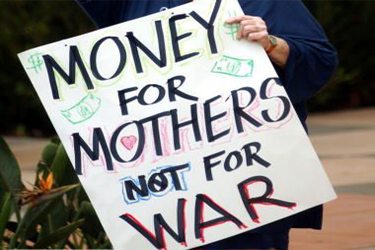The Haves and Have-Nots of Abortion
A lot of women seem to be embracing single motherhood because they've absorbed their community's hostility to abortion. But college-educated liberal women generally feel okay about abortion to prevent it, leading to a growing economic and social rift between women.

Out of the many interesting reaction pieces out there to the 40th anniversary of Roe v Wade last week, the most novel was this article by Naomi Cahn and June Carbone for Slate. In it, they argue that one of the side effects of Roe was the explosion of single motherhood, especially in the red states, as refusing to abort an unintended pregnancy became a marker of one’s fidelity to a conservative mindset.
The working class had long dealt with the inconvenient fact of an accidental pregnancy through the shotgun marriage. As blue-collar jobs paying a family wage have disappeared, however, so has early marriage. Women are then left with two choices: They can delay childbearing (which might entail getting an abortion at some point) until the right man comes along or get more comfortable with the idea of becoming single mothers. College-educated elites have endorsed the first option, but everyone else is drifting toward the second. In geographical regions and social classes where the stigma for having an abortion is high, the non-marital birthrate is also high. Without really thinking about it or setting up any structures to support it, women in more conservative communities are raising children alone.
This would also go a long way to explaining the demographic shift in women who have abortions. As I wrote for the American Prospect last week, in the years immediately following Roe, most women getting abortions were childless and unmarried. Now, most of them are still unmarried but mothers. While plenty of women still use abortion as a back-up plan to delay child-bearing until they’re married and financially stable, it seems that an increasing percentage of abortion patients are women who, because they already have children, know that they simply cannot afford to have another. Pressuring childless women in conservative communities to “face the consequences” of having sex by continuing unintended pregnancies doesn’t really mean getting rid of abortion. It just means that more abortion patients experience both single motherhood—and often financial deprivation—as well as abortion.
This seems incredibly inefficient, especially compared to the preferences of college-educated blue state professionals who tend to see abortion as a first resort as a way to prevent family instability and financial hardship, instead of as a last resort that’s used after financial hardship and family instability have become a fact of life. The result is that the already-privileged end up retaining their privileges, while women who don’t have those benefits fall further behind. Communities that see abortion as a first resort, instead of something you do after you have children and fear that you can’t have any more, have lower divorce rates, remarriage rates, and non-marital birth rates.
It’s easy to say that conservative communities are shooting themselves in the foot by creating a situation where abortions keep happening, but only after women have committed to rearing children in less stable family environments. But the truth of the matter is it’s more complicated than that. Conservative hostility to abortion has very little to do with “life,” after all, which is why conservatives are also hostile to contraception and sex education that is known to reduce abortion rates.
If you assume that opposition to abortion is rooted in a sin/punishment attitude towards sex and a desire to keep women from achieving equality, then this system that leads to escalating rates of single motherhood makes perfect sense. If a woman becomes a single mother when she didn’t want to be one, then that satisfies the right-wing need to see women endure “consequences” for daring to have sex. Better yet, the consequence is that she’s got a small child to care for, which is well-known for making it that much harder for women to climb the economic ladder. All this, plus being a single mother outs you as being someone who had—gasp!—sex, and making sure that your sexual status is visible to your community is all-important in the land of social conservatives.
Of course, many of the downfalls of single motherhood are not inevitable. If we had a better social safety net, more family-friendly labor laws, federally-subsidized day care, and a better health care system, becoming a single mother wouldn’t have to be so hard. But, surprise surprise, the same conservatives who push the idea that a single woman has a “moral” obligation to continue an unintended pregnancy also have worked very hard to make this a country where single mothers have little to no support. It’s a closed system that keeps women who are already facing educational and geographic disadvantages down.
Pro-choicers often point out that abortion bans won’t end abortion, but they will create unequal access to it. Women who have education and financial means will always be able to get abortion. As this article makes clear, having your family support you in your decision to abort rather than become a single mother also helps significantly. But what’s clear is that even with abortion remaining legal, anti-choicers have already created this gap between the haves and have nots among women. The haves feel entitled to use abortion to delay child-bearing for a time when they feel more stable and to protect their economic futures. The have-nots feel like they have to go through with unintended pregnancies, even if doing so means giving up on other hopes and dreams. And then some of them later have abortions in order to protect the children they already have from future financial stress. We’ve gotten to a point where having an abortion for your own sake and not just for your children is a privilege. The problem is that it needs to be treated like a right.
